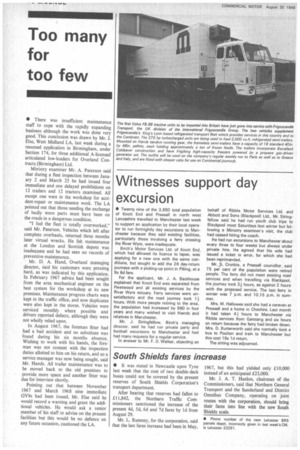Too many for too few
Page 20

If you've noticed an error in this article please click here to report it so we can fix it.
• There was insufficient maintenance staff to cope with the rapidly expanding business although the work was done very good. This conclusion was drawn by Mr. J. Else, West Midland LA, last week during a resumed application in Birmingham, under Section 174, for three additional A-licensed articulated low-loaders for Overland Contracts (Birmingham) Ltd.
Ministry examiner Mr. A. Paterson said that during a fleet inspection between January 2 and March 25 he had issued four immediate and one delayed prohibitions on 12 trailers and 12 tractors examined. All except one were in the workshop for accident-repair or maintenance work. The LA pointed out that those needing the exchange of badly worn parts must have been on the roads in a dangerous condition.
"I feel the fleet is totally overworked," said Mr. Paterson. Vehicles which left after complete overhauls, returned three months later virtual wrecks. He felt maintenance at the London and Scottish depots was inadequate and he had seen no records of preventive maintenance.
Mr. D. A. Hand, Overland managing director, Said his customers were pressing hard, as was indicated by this application. In February 1967 advice had been sought from the area mechanical engineer on the best system for the workshop at its new premises. Maintenance progress charts were kept in the traffic office, and now duplicates were also kept in the stores. Vehicles were serviced monthly where possible and drivers reported defects, although they were not wholly relied upon.
In August 1967, the foreman fitter had had a bad accident and no substitute was found during his six months absence. Wishing to work with his hands, the foreman was not content with the inspection duties allotted to him on his return, and so a service manager was now being sought, said Mr. Hands. All trailer maintenance was to be moved back to the old premises to provide more space and another fitter was due for interview shortly.
Pointing out that between November 1967 and March 1968 nine immediate GV9s had been issued, Mr. Else said he would record a warning and grant the additional vehicles. He would ask a senior member of his staff to advise on the present facilities but this would be no defence on any future occasion, cautioned the LA.




















































































